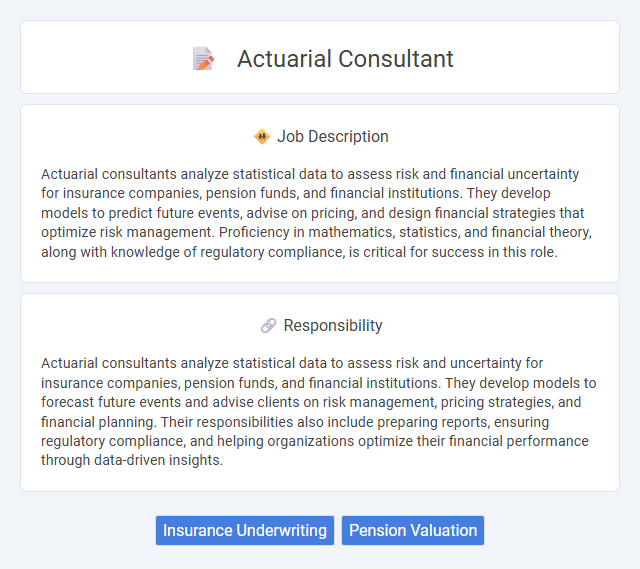
Actuarial consultants analyze statistical data to assess risk and financial uncertainty for insurance companies, pension funds, and financial institutions. They develop models to predict future events, advise on pricing, and design financial strategies that optimize risk management. Proficiency in mathematics, statistics, and financial theory, along with knowledge of regulatory compliance, is critical for success in this role.
Individuals with strong analytical skills and a solid background in mathematics or statistics are likely to be well-suited for a career as an actuarial consultant. Those who enjoy problem-solving and have the ability to interpret complex data to assess risk may find this job rewarding. People who prefer detailed, structured work environments and can handle long periods of focused concentration may have a higher probability of success in this role.
Qualification
An actuarial consultant must possess strong analytical skills and a deep understanding of mathematics, statistics, and financial theory to assess risk and uncertainty effectively. Professional qualifications such as the Associate or Fellow status from recognized actuarial bodies like the Society of Actuaries (SOA) or the Casualty Actuarial Society (CAS) are essential for career advancement. Proficiency in programming languages like Python or R and experience with data modeling software significantly enhance an actuarial consultant's ability to deliver accurate risk assessments and financial forecasts.
Responsibility
Actuarial consultants analyze statistical data to assess risk and uncertainty for insurance companies, pension funds, and financial institutions. They develop models to forecast future events and advise clients on risk management, pricing strategies, and financial planning. Their responsibilities also include preparing reports, ensuring regulatory compliance, and helping organizations optimize their financial performance through data-driven insights.
Benefit
Actuarial consultants likely provide valuable insights that help companies manage financial risks and improve decision-making processes. Their expertise in analyzing statistical data and forecasting future events probably leads to optimized insurance plans and retirement benefits for clients. Engaging an actuarial consultant may result in more accurate pricing strategies and enhanced long-term financial stability for businesses.
Challenge
Actuarial consultant roles likely involve complex problem-solving challenges that require strong analytical skills and attention to detail. Navigating uncertain financial risks and modeling future scenarios may pose significant intellectual demands. The job probably demands continuous learning to adapt to evolving regulations and market conditions.
Career Advancement
An actuarial consultant specializes in risk assessment and financial forecasting, providing critical insights for insurance, pension, and investment sectors. Career advancement in this field often involves progressing from junior analyst roles to senior consultant or management positions, supported by professional certifications such as the Society of Actuaries (SOA) or the Casualty Actuarial Society (CAS). Mastery of advanced statistical software and continuous professional development significantly enhance promotion prospects and salary growth.
Key Terms
Insurance Underwriting
Actuarial consultants specializing in insurance underwriting analyze risk data to develop accurate pricing models and optimize policy terms for insurance companies. They apply statistical techniques and predictive analytics to assess potential losses, ensuring underwriting guidelines align with financial objectives and regulatory requirements. Their expertise enhances risk selection processes, improving profitability and maintaining competitive insurance product offerings.
Pension Valuation
Actuarial consultants specializing in pension valuation analyze and assess the financial health of retirement plans by calculating liabilities, asset values, and funding requirements using advanced actuarial models. They ensure compliance with regulatory standards such as IAS 19 and local pension regulations while advising employers on risk management strategies and contribution policies. Their expertise is critical in delivering accurate pension fund valuations that support corporate financial reporting and long-term benefit sustainability.
 kuljobs.com
kuljobs.com